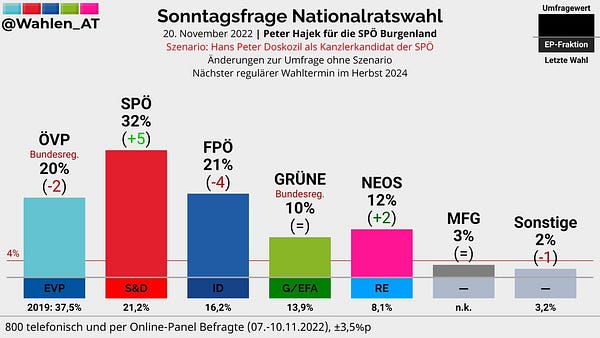Day One
tag eins, a new online publication, is looking to change Austrian journalism and the way Austrians consume their news on the internet
Servus!
The last few weeks haven’t exactly been a golden age for Austrian journalism. Two prominent editors have lost their jobs after leaked text messages revealed just how uncomfortably close they had become to their subjects. Die Presse’s editor, publisher, and CEO Rainer Nowak resigned last week after he had expressed his hopes to ex-Austria Holding PLC director Thomas Schmid of becoming the ORF’s director general. Meanwhile, the ORF’s head of television news Matthias Schrom also stepped down because of unbecoming conversations he’d had with former Freedom Party (FPÖ) leader Heinz-Christian Strache.
These messages were “the tip of the iceberg,” the journalist Dominik Ritter-Wurnig tells me, when it comes to the relationship between journalism and politics in Austria. These cases “didn’t come as a surprise to us,” as for quite a long time now, it has been clear that Austrian “journalists and the objects for their reporting are too close. It’s a very tight-knit relationship. Probably because of the size of the country, a lot of journalists [simply] get too close to politicians and therefore lack the distance to engage in proper reporting,” Ritter-Wurnig says.
This unbearable closeness is one of the reasons the CUNY-educated journalist has returned to Vienna after a stint reporting in Berlin to co-found a new media startup. tag eins (Day One) is to be something hitherto unseen in Austria: a member-funded online magazine. tag eins won’t take advertising from either the private sector or the government in the form of public service announcements; neither will it receive direct government subsidies. Rather, its funding will come entirely from its readers: from monthly and annual memberships, meaning tag eins will not be beholden to the state, a benefactor, or a corporate ownership structure.
The financial relationship between media and the state is another problem Ritter-Wurnig identifies in Austrian journalism. “Journalism is an economic crisis—not only in Austria,” he points out during an interview at tag eins’ new office space in the Austrian capital, “and this has meant that, in the last couple of years, the media has come to rely more and more on government subsidies,” especially indirect help via the placement of PSAs and government advertising in newspapers and magazines. This means that, for many publications, “up to 20 percent of revenue is coming from one customer, the government, and this, quite frankly, has led to the media becoming reliant on their biggest customer, which then changes the journalism” these publications produce.
Ritter-Wurnig and his colleagues are also critical of online journalism itself, which they see as being too headline-driven, clickbaity, and unserious. tag eins, by contrast, is looking to create a platform for in-depth, constructive, and solutions-oriented online journalism. “The news reporting is quite good” in the Austrian online journalism space, he says, “but what we’re lacking is what comes next: the ‘why,’” partly because Austria’s newsweeklies haven’t managed the online transition particularly well. Ritter-Wurnig compared the current online options to fast food; “what we’re trying to offer is bowl food: something that’s as convenient, but is healthier and tastes better.”
tag eins is currently undertaking its first membership drive and is looking to attract 1,000 supporters before it begins publishing; if it fails to find those members before November 28, the publication will fold. (As of 21:00 on November 21, 513 people had signed up to be tag eins members.) The magazine faces many uphill challenges, not least getting Austrians who have become used to a diet of free online news to pay for it. But until someone tries, we will never know if such a venture might work in Austria as it has in Germany, Switzerland, the Netherlands, and Denmark. Coming back to Vienna after living in New York and Berlin and talking about tag eins, a lot of people asked Ritter-Wurnig if he was crazy, he says. We will find out soon enough.
Bis bald!
Thank you for subscribing to the Vienna Briefing. If you know someone who might also be interested in receiving this newsletter, consider sharing it with them today.
The Vienna Briefing is a free newsletter. If you enjoy and would like to support my work, think about sending me a tip via PayPal. Thank you to all those who have made donations.
Climate Activists Attack Klimt
Climate activists threw a black oil-like substance at the Gustav Klimt painting Death and Life last week before attempting to glue themselves to the wall of Vienna’s Leopold Museum. The painting was protected by a Perspex shield and the museum said no damage was done either to the painting or the frame.
Asylum Applications Up
Almost 90,000 asylum applications have been logged already this year in Austria: more than in the whole of 2015, the year of the migration crisis. There has been a sharp increase in asylum seekers coming from India and Tunisia even though their chances of gaining asylum in Austria are close to zero.
Doskozil To The Rescue?
The Social Democratic Party (SPÖ) would perform five points better were Hans Peter Doskozil its candidate for the chancellorship at the next election, according to a new poll. The study was commissioned by the SPÖ in Burgenland, where Doskozil is the state governor.


The Vienna Briefing will return on December 7




